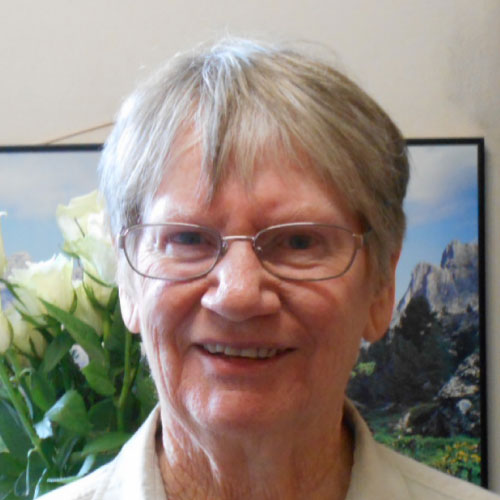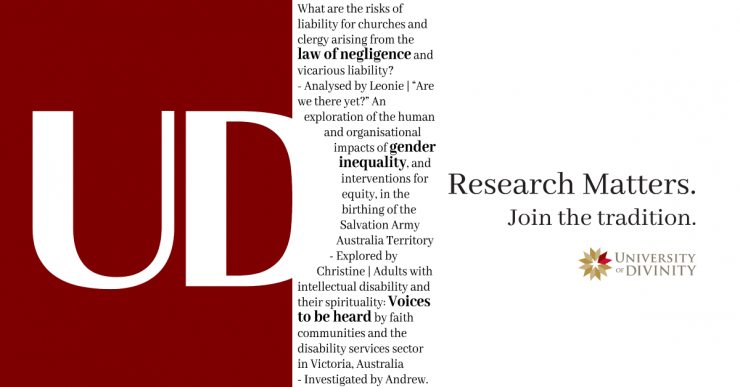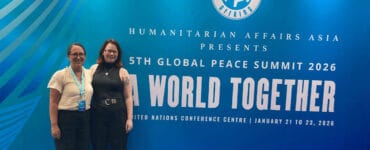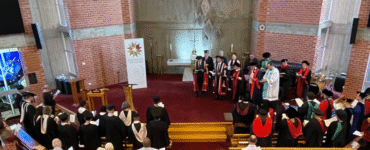This article is written in memorium of Dr Michael Bowden (21 March 1947 – 11 April 2020), who graduated with a Doctor of Philosophy from the University of Divinity in December 2019.
In accompanying students engaged in research, I have been challenged and inspired. Sometimes I wonder: how would questions have formed, self-knowledge deepened, perspectives shifted, new insights and even visions emerged and been shared without the research? In what I will discuss below, from a particular student’s story, I believe the research was critical, and yes, it absolutely mattered.
Michael Bowden received the Doctorate award for his thesis ‘Searching Altyerre to reveal the Cosmic Christ’ in 2019. As Mike’s co-supervisor, I will address some research-related issues that arose in his thesis, through consideration of our university’s Graduate Attributes.
Learn: Graduates are equipped for critical study, especially of Christian texts and traditions
As some of his writings illustrate, such as those appearing in Eureka Street and in his weekly ‘Gospel reflections’, Mike was already equipped for critical study well before commencing his doctoral studies. As the thesis enterprise began in earnest, so did Mike’s passion for reading and research increase and take on a new urgency. The intellectual endeavor was inter-disciplinary: spirituality, linguistics, missiology, history, anthropology, theology… There was the constant effort and gain in engaging with the relevant literature; the writings of feminist scholars such as Elizabeth Johnson and theologians, Karl Rahner and Jurgen Moltmann remained of great importance, as did other more personal associations with Diane James (cultural anthropologist), Denis Edwards (Christian Spirituality), Gavan Breen (Linguist) and missiologist Roger Schroeder svd. The research entailed on-going dialogue with persons, often through emails, and until the advance of Motor Neurone Disease, through telephone conversations. Living in Australia’s Northern Territory prompted such responses, and there were blessings as well as curses in being remote – and isolated.
Articulate: Graduates articulate theological insight and reflection
As the writing and research continued, Mike constantly faced his own demons, as do we all: self-sufficiency, prejudice, impatience… It is not always easy to hold in proper balance ‘the question’ and ‘the process’, to honour ‘the fire in the belly’, but to demonstrate ability and humility in making the necessary adjustments to ensure one’s personal and professional integrity. For some, the articulation of the ideas, and of critical analysis is the most difficult part of all. Mike certainly did not fit comfortably into the academic system. And yet the University accommodated him, received him, supported him. Mark Brett’s professional support was sought, welcomed and greatly valued, as was the support of Yarra Theological Union (Michael Kelly in particular). John Honnor as primary supervisor, stood steadfast, persisting, encouraging and demanding the highest standards all along.
Communicate: Graduates communicate informed views through structured argument
Mike’s research was grounded in views established over years, particularly with the Aboriginal elders. What I find especially noteworthy is that Mike incorporated and respected Arrernte ways of thinking and expression into his own thesis discourse. His writing mirrored what his thesis was about – a meeting place between two very different world views. Without losing the authentic voice and integrity of the elders’ insights, Mike somehow avoided the disconnect which could easily have emerged in the writing. Such communicating was a result of painstaking hours of listening, questioning, re-framing, pondering, starting over, testing… all the stuff of careful research.
Engage: Graduates engage with diverse views, contexts and traditions
Any good research will be conducted from a position of respectful engagement with others. Dialogue, with the differing understandings of Lutheran missionaries and scholars, for example, impelled Mike to further research and better understanding. His own dearly held Catholic beliefs were also challenged; his preparedness to go into deeper waters proved to be transforming. Above all, the sustained research conducted with the four Arrernte elders was without doubt the most critical. Extracts from the conversation with elders from the Ngkarte Mikwekenhe Community, reveal how such engagement grounded and propelled the research.
We need the stories of our lives to go to professional people so that they see what it means for us to have this sacredness in our lives. Through doing this thesis, Mike is building a bridge… He is putting our words on the bookshelves of the university…
He is the echo of our life.
What he has written is what our young people need to read. (from Thesis Introduction).
Serve: Graduates are prepared for the service of others
Having completed his thesis, Mike immediately began work on the book ‘Unbreakable Rock’ (published 2020 by Alella Books). As the subtitle ‘Exploring the Mystery of Altyerre’ indicates, this book relates very much to his thesis. It is more reader-friendly, and includes paintings by renowned Arrernte artists. While incorporating research findings from the thesis, the book gives a wider story, for a wider than academic audience. It furthers the author’s goal which was for his thesis to be ‘for the service of others’.
If this article has stirred interest in Michael Bowden’s thesis, then we might be correct in saying the research mattered. I’m sure Mike’s spirit is around me as I write, and hear him whisper: ‘And all is Mystery’.

Robyn Reynolds olsh spent many years living and working with indigenous Australians in remote communities of the Northern Territory and after ten years as lecturer and Dean of students at Darwin’s Nungalinya College, came to Yarra Theological Union in Melbourne. Her areas of research and teaching are in Religion and Culture, Indigenous studies, Missiology, Spirituality, Religious Education, and Feminist Studies.







Add comment